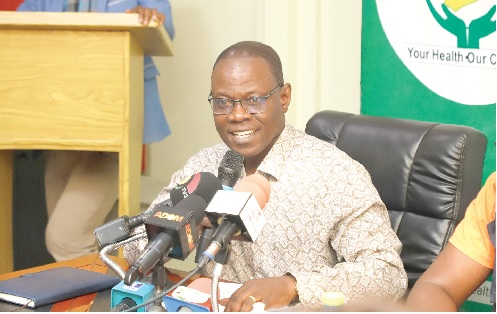
Health Service rolls out cholera vaccination campaign
The Ghana Health Service (GHS) has confirmed 196 cases of cholera in four regions – Greater Accra, Eastern, Central and Western, with 21 deaths.
The confirmations were done from 2,389 suspected cases the GHS recorded across the country.
As a result, the GHS has, for the first time, introduced a reactive cholera vaccine which will be administered from today to Tuesday, December 3, this year.
The vaccination is targeted at 150,634 people at hotspots, starting with Awutu Senya District, which the GHS has marked as a high-risk area.
The oral cholera vaccine would be administered to persons aged two years and above in the communities with outbreaks, excluding pregnant women and breastfeeding mothers.
The Director-General of the GHS, Dr Patrick Kuma-Aboagye, who launched the reactive vaccination campaign, said it was aimed at bolstering the government’s response to the cholera outbreak to safeguard the health of communities across the country.
He said the vaccination teams would be conducting house-to-house visits as well as engaging with communities at workplaces, social events and religious gatherings.
Dr Kuma-Aboagye stressed that while the vaccine was a critical addition to existing cholera control measures, it must be used in conjunction with improved sanitation and hygiene practices.
“The vaccine is most effective when combined with proper sanitation, safe drinking water and personal hygiene,” he said.
The GHS Director-General called on journalists and community leaders to act as ambassadors for the cholera vaccination campaign, urging them to disseminate accurate information and encourage public participation.
“Your role in shaping public health discourse is invaluable,” Dr Kuma-Aboagye added.
WHO
The World Health Organisation (WHO) Representative in Ghana, Dr Frank John Lule, who gave a global situational report on the contagious disease, said currently there had been over 481,000 cholera cases reported globally, with nearly 4,000 deaths.
The African region, he said, bore a disproportionate burden, accounting for two-thirds of the cases, exacerbated by climate-related challenges such as floods and inadequate sanitation.
Dr Lule, therefore, reassured the public that the vaccine was both safe and effective, since it had proved to be effective in similar contexts.
He added that while the vaccination campaign was a critical measure, it was important to put in place long-term solutions with emphasis on improving economic development, ensuring universal access to clean drinking water and enhancing sanitation infrastructure.
“These measures are essential for preventing future outbreaks,” Dr Lule said.
